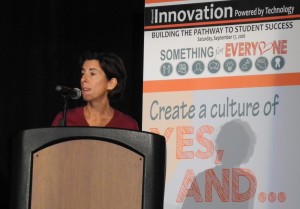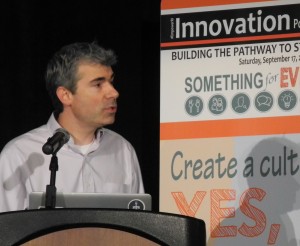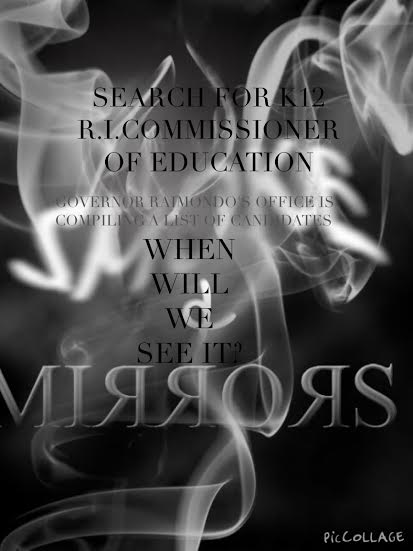
Hundreds of educators, school administrators, and students came together at the RI Convention Center today for the fifth annual “Innovation Powered by Technology” conference, sponsored by the RI Dept. of Education. Across dozens of small discussions, panels, and demos, participants from all across the state had the chance to share best practices, learn about innovations, and build community. A detailed program is available and the day’s events were captured in a rich Twitter stream.
Two of the highlights were back-to-back talks just after lunch, featuring Gov. Gina Raimondo on her perspective on technology in the state’s education system, and a high-energy presentation on personalized learning by Rhode Island’s chief innovation officer, Richard Culatta.
Gov. Raimondo began by expressing thanks for Rhode Island’s cadre of outstanding educators, “People like yourselves who are always willing to learn more, do more, be on the cutting edge for our kids. And technology is core to that. Technology gives us a direct connection to how our students think, act, work, and communicate. The smarter we can be about technology, the better we’ll be able to teach and deliver education.”
She acknowledged the challenges that our education system faces. “The thing that most keeps me up at night,” Raimondo said, “is making sure that every Rhode Islander has the skills and education they need in order to get a good job in this economy. This economy is, in many ways, scary. It has more risk than it ever had, it’s more dynamic than its ever been, and requires a higher degree of skill and education than ever in order to be successful. 70-plus percent of all good jobs in Rhode Island require some degree past high school, but only about 40 percent of Rhode Islanders have that. So every child that’s in our K-12 system right now, it’s on us to make sure that they get the skills that they need in order to be successful.”
“That is the thing that I think will turn Rhode Island’s economy around,” Raimondo continued. “Businesses are going to want to be here if we have a skilled talent base.”
The Governor talked about some of the successes of the past two years.
“We are rolling out the CS4RI program. People are raising their hands, schools, teachers, principals, students, at a faster rate than we expected, we’re ahead of all of our goals. And I’m proud that Microsoft chose Rhode Island — we’re the only state where they’re doing a statewide rollout.”
“We also have rolled out the Advanced Coursework Network and PrepareRI to make sure that every high school student in a public school can take college-level courses for college credit for free. In some ways, this isn’t a new program, but instead of $200 a class, it’s free. That’s what it’s all about: taking away what might seem like a small barrier and having a massive impact. if you can get a semester of college under your belt for free in high school, that can change your life.”
“We’re working as hard as we can to get P*Tech off the ground, thank you to Westerly and Rogers, and we’re talking about it with Woonsocket High School and PCTA. I was down in Westerly two weeks ago, and it is so exciting talking to these young people. I said, ‘Why did you sign up for P*Tech?’ and they all had an answer. I was so impressed. Ninth graders telling me, ‘Because I think it will give me an opportunity.’ They know all about it, and they were psyched to be in the program.”
A reporter from RI Future had the chance to follow up with Raimondo to ask just how significant these kinds of expanding digital efforts are in attracting companies like PayPal to the state.
“Very important,” Raimondo said. “The primary reason to do it is because these kids deserve a chance to be successful, and a good education is what is necessary. But it’s very important. I have many conversations with companies looking at coming to Rhode Island, and they ask me, ‘What are you doing, Governor, to make sure that ten or 15 years from now, we have a skilled pipeline of people that have computer skills?’ They don’t want to just know about RIC, CCRI, URI, and today’s graduates, they want to know, if we come to Rhode Island, if we are going to be there for twenty years, are you building a pipeline.”

Richard Culatta was hired in the new role of Chief Innovation Officer in January, after working in the US Department of Education office of Educational Technology, and he has clearly hit the ground running on the issue of personalized learning, which he discussed in a rapid-fire talk.
“Nobody says we shouldn’t adapt learning to the students,” said Culatta. “But the challenge is, how do we do that? What tools are necessary? What do we need?”
“As a teacher, I knew I was teaching to the middle and that the schedule was trumping my kids. Imagine for a second, if we said every student in our system, every student in Rhode Island, will have 100% mastery; what will be flexible is the time and the approach used to get there.”
“Do you need technology to personalize learning? No. Unless you want to do it at scale.”
“If you have a classroom with 3 or 4 or 5 students, well, at that point, you can do a heck of a lot of personalizing, tailor very much to their needs without any technology. But when you have a high school with 5 classes a day with 30 kids in each of the classes, the ability to tailor the learning would just be crushing. Imagine having 50 IEPs that you’re planning every day.”
“How can we get that granular level of tailoring for each student and not have it be too burdensome? What that looks like, we have to figure out. I don’t care if we’re delivering instruction on technology or not, that’s a separate conversation, but we need to figure out some tools that can help teachers manage personalized learning so that we can do this at scale.”
Culatta closed with a provocative thought about a new “digital divide” not about access, but about the difference between using digital tools in passive versus active modes.
“What I’d like us to all be thinking about is a new digital divide: a digital use divide. How can we be using technology not to digitize traditional practices, not to have a digital version of what used to be on the chalkboard. How do we use technology to engage and empower and connect, and allow our students to be designers and builders, and allow them to work on what they want, when they want — that’s relevant, and aligned to quality standards that are common and accepted across the board.”
“A rigorous curriculum that is still tailored to individual needs and not be soul-crushing for teachers to have to come up with 75 individual lesson plans every day. That’s what we’re trying to do. That’s pretty audacious. But I think Rhode Island is the place that can pull it off faster and better than anybody else, and if we do, it will transform not just Rhode Island, but the world.”
]]>Glen Ford of Black Agenda Report is one of my favorite analysts and journalists, a man whose reportage has been compared to the work of Frederick Douglass by Prof. Tony Monteiro. His mind is sharp and brilliant in ways that make me honored to have corresponded with him. Here, Ford explains the way that the Democratic Party has been infiltrated by the neoliberal anti-teacher union charter school lobby and what to expect from hucksters like Sen. Cory Booker, a right wing Republican in Democratic Party clothing. As the neoliberal agenda continues to be made manifest in our communities, be mindful of the patterns Ford discusses here and which were discussed in the previous post on this topic in Chicago.
]]> Dr. Ken Wagner, Rhode Island’s new commissioner of public education, was asked what strategies he would propose to address the achievement gap between students of color and their Caucasian counterparts at the July 13 joint meeting of the Board of Education and Council on Elementary and Secondary Education at which his nomination was confirmed. (video available here)
Dr. Ken Wagner, Rhode Island’s new commissioner of public education, was asked what strategies he would propose to address the achievement gap between students of color and their Caucasian counterparts at the July 13 joint meeting of the Board of Education and Council on Elementary and Secondary Education at which his nomination was confirmed. (video available here)
What is essential for closing the achievement gap, he said, is to have the same “high learning expectations for all students.” In using this phrase, he is referring to the Common Core State Standards. These standards, along with the EngageNY curriculum aligned to them, a curriculum which Dr. Wagner has taken credit for developing in NY State, have been declared developmentally inappropriate for young children by many experts on early childhood education. (See Joint Statement of Early Childhood Health and Education Professionals on the Common Core Standards Initiative)
In his remarks, Wagner disparaged these authentic voices by claiming that ideas on developmental stages by the esteemed child psychologist Jean Piaget are passé. According to Wagner, “Now the consensus seems to be much more that students can achieve things never thought possible, provided the right supports.”
I am curious to know which experts on early childhood development Wagner was referencing. There is an article by cognitive psychologist Dr. Daniel Willingham that seems on the surface to corroborate Dr. Wagner’s point. (“Ask the Cognitive Scientist: What Is Developmentally Appropriate Practice?”(AMERICAN EDUCATOR, SUMMER 2008) Willingham does indeed critique Piaget’s developmental stages and finds them wanting. However, he also states: “… changing strategies and experimenting with different methods of presenting and solving problems may be a more effective way to improve instruction than trying to match instruction to children’s developmental level.”
If you substitute the Common Core Standards/EngageNY rigid pacing for the words “developmental level,” you have an argument for not following scripted lessons paced according to grade level, which is what EngageNY provides. Scripted lessons means that teachers are provided with specific questions and explanations they are to use to teach each lesson, and students are expected to respond in predictable ways. For anyone who has spent any time with children, it should be clear that their responses are and should be unpredictable—effective teachers are open to the teachable moment, and this is a crucial tool for reaching and engaging students.
 Declaring that young children can handle more difficult concepts than we have given them credit for does not translate into saying all children in the same grade should be held to the same content at the same pace, which the Common Core, EngageNY and accompanying testing essentially require. Why are Dr. Wagner and other adherents of lock-step learning using an anti-Piaget argument as an excuse for what actually amounts to what many veteran teachers consider educational malpractice? What comes to mind is how convenient this argument is for stifling objections to the scripted materials that state departments of education and districts want teachers to follow.
Declaring that young children can handle more difficult concepts than we have given them credit for does not translate into saying all children in the same grade should be held to the same content at the same pace, which the Common Core, EngageNY and accompanying testing essentially require. Why are Dr. Wagner and other adherents of lock-step learning using an anti-Piaget argument as an excuse for what actually amounts to what many veteran teachers consider educational malpractice? What comes to mind is how convenient this argument is for stifling objections to the scripted materials that state departments of education and districts want teachers to follow.
I found it ironic that when questioned by the student representative at the Board of Education meeting, who asked if the Common Core Standards truly allow teachers to address individual students’ learning, Dr. Wagner responded: “So the standards are not prescriptions. … I do not see this work as scripted. … It’s about justice.” Numerous experienced teachers and others knowledgeable about young children disagree.
According to the testimony of Dr. Walter Schartner, Sayville School Superintendent with 41 years of experience in education, and 26 years as an administrator:
“The NY State modules and domains that script what teachers—very, very successful, highly effective teachers–do is the problem. … I hope everybody else has a chance to go onto EngageNY, and look on how scripted these modules are, in terms of the first two minutes do this, the next eight minutes do this. It’s an insult to our teachers ….”
Programs serving young children need highly trained, autonomous teachers who are aware of the developmental appropriateness of content and process for the growth of the individual children in their charge. Those who are obsessed with a rigidly paced, standardized-test/data informed approach see value in “outcomes” and “accountability” rather than in respecting the lived experience of children.
When will sanity be restored to teaching and learning? Our children deserve it, and the clock is ticking.
]]> Deborah Gist’s Ocean State Voyage has ended and her replacement Dr. Ken Wagner begins his tenure as Rhode Island’s Commissioner of Elementary and Secondary Education today. The hiring process, with its “listening sessions” and its search for a gentler more accommodating commissioner, signals a departure from the Gist/Mancuso regime. It remains to be seen if this difference is substantive or merely cosmetic. Governor Raimondo promised an open and inclusive hiring process.
Deborah Gist’s Ocean State Voyage has ended and her replacement Dr. Ken Wagner begins his tenure as Rhode Island’s Commissioner of Elementary and Secondary Education today. The hiring process, with its “listening sessions” and its search for a gentler more accommodating commissioner, signals a departure from the Gist/Mancuso regime. It remains to be seen if this difference is substantive or merely cosmetic. Governor Raimondo promised an open and inclusive hiring process.
Students, teachers, parents, school committee representatives, board members, administrators, charter school advocates and union leaders known or recommended to the Governor were invited to attend so-called “listening sessions” and make their views known. Nine listening sessions were held with the Governor and the new Board of Education Chairwoman Barbara Cottam, among the listeners. Discussions focused on the desirable characteristics of a prospective commissioner. Participation was by invitation only.
Raimondo took charge of the search for Gist’s replacement with the blessing of the BOE and its new chairwoman. In May, Brad Inman, the governor’s Director of Constituent Services, wrote in response to my queries: “The Board of Education asked the Governor’s office to do the initial vetting and present the Board with a list of finalists for their consideration. It will then be the Board who selects the Commissioner.”
When I tried to find out who, in the Governor’s office, was doing the vetting (or had the educational expertise to do so) nobody was at liberty to tell me.
At a May 14 BOE Meeting, Chairwoman Cottam informed the board that “candidates are currently being interviewed and she expects a finalist(s) will be sent to the Board from the Governor’s office shortly.” The “finalist(s)” indicates that Cottam didn’t know whether a group of candidates or the one final choice was to be passed on to the Board for their approval. At the subsequent meeting, she reported that “interviews for the next Commissioner of Elementary and Secondary Education have continued and that there are many great candidates.” Who was doing the interviewing and who were the great candidates?
After the much touted “listening sessions” the search sank from public view. There was no BOE Search Committee and, as far as I can discover, no new job description that incorporated the findings of the listening sessions. The one that I received from Angela Teixeira, special assistant to the commissioner and liaison to the Board of Education, is dated September 2004.
As the Warwick Beacon reported, comments made by Kevin Gallagher, the governor’s deputy chief of staff, indicated why what he called a “help wanted ad” was rejected. From the Beacon: “Instead, the decision was made to define the characteristics the next leader of the Rhode Island Department of Education (RIDE) ought to possess. The administration, Gallagher said, intends to use that information to identify people who ‘fit that profile,’ rather than ‘sitting back passively’ and waiting for candidates to apply.”
Ken Wagner was recruited in much the same way that Deborah Gist was recruited by the Carcieri administration and his BOE (then the Board of Regents) in 2009. What Governor Carcieri wanted was a prominent “reformer” to head R.I.’s education establishment. This seems to be what Governor Raimondo wanted too, although she didn’t want Gist. I suppose that she also wants criticism of high-stakes testing to stop, parental and student opt-outs to end, the free proliferation of charter schools and no more complaints about the PARCC or the Common Core. I suppose, too, that she believes Dr. Wagner can help with these things.
The R.I. law governing the appointment of education commissioners specifies that they be chosen by the (gubernatorially appointed) Board of Education, whereas other positions at the same level–directors, for example–are straight-forward gubernatorial appointments. This discrepancy caught the attention of East Side Senator Gayle Goldin, who introduced the bill to change it which was passed by the R.I. Senate last session. The Senate voted that in the future the Governor alone should select Commissioners of Education, although this will not become law until it is also passed by the R.I. House. The Governor’s choice would then be subject to the advice and consent of the R.I. Senate.
The advice and consent of the Senate versus the approval of the board of education may seem insignificant, no great improvement to the selection process. But it is, I think, in involving democratically elected representatives who are responsive to their constituents and familiar with the schools in their districts. Having witnessed both board meetings and meetings of legislative education committees, I’d say the senators are often better informed, more independent of the RIDE bureaucracy, and certainly more approachable than appointed board members.

It is heartening to see a robust discussion on the imminent use of the PARCC test in Rhode Island’s public schools, but the state Department of Education seems to have made up its mind before the test has even gotten off the ground. It is already actively encouraging school districts to use the PARCC to penalize students as early as next year.
Before having any chance to meaningfully examine how this untried test is working, or to determine whether, like the NECAP, it will have a disproportionate and devastating impact on poor and minority children, English Language Learners and students with disabilities, Commissioner Deborah Gist has already advised school districts they may “use PARCC results as a component in determining students’ grades” beginning as early as the upcoming 2015-16 school year. The Commissioner, with the backing of the Council on Elementary and Secondary Education, has also encouraged school districts to consider using the PARCC as a high stakes graduation requirement for the Class of 2017.
In light of this push by RIDE, the biggest concern isn’t necessarily whether testing should be delayed for a year or even whether children should be able to opt out – it is whether the test results should be used punitively against students rather than as a supportive accountability tool to help them and their schools succeed. RIDE likes to claim its goal is the latter, but as we know from the NECAP debacle, it operates more like the former.
RIDE’s desire to punish kids by allowing the test to be used in this high stakes fashion so quickly is extremely troubling, especially since education officials know full well the importance of time in getting a new test like this off the ground. Last August, before changing course, the Commissioner gave good reasons why PARCC should be used as a high stakes test beginning in 2020, not 2017. As she noted then:
“We need to make sure that everyone has adequate time to prepare for the implementation. That means students having adequate support and time, families and teachers and school and district leaders need adequate time to make the changes to their support and interventions for individual students.”
By instead giving school districts the option to use the test results against students a year from now, RIDE is actually doing everything it can to make sure students are not fully prepared. To make matters worse, the local implementation of such testing places pressures on students of particular school districts who embrace PARCC in this fashion, while protecting students who happen to live in more skeptical school districts.
We all want students to succeed, but this approach spells disaster and will inevitably lead to a repeat of the fiasco surrounding the NECAP. Opting out of the PARCC test means little if students face a reduction in grades or denial of a diploma in a few years for failing to take it. Nor is it fair if students who opt in find their grades lowered because of their scores on the test. Whether one agrees or disagrees that PARCC can be a useful support tool, parents and others concerned about punitive standardized testing should be demanding first and foremost that this test not be used for high stakes graduation or grading decisions in the way that RIDE is, sadly, so hastily determined to use it.
]]> State education Commissioner Deborah Gist is leaving Rhode Island for Tulsa, Oklahoma and former Woonsocket state Rep. Jon Brien, my latest NBC 10 Wingmen adversary, says her departure is the fault of the teachers’ unions.
State education Commissioner Deborah Gist is leaving Rhode Island for Tulsa, Oklahoma and former Woonsocket state Rep. Jon Brien, my latest NBC 10 Wingmen adversary, says her departure is the fault of the teachers’ unions.
Blaming organized labor for getting rid of Gist is like blaming vaccines for getting rid of the measles. There’s always a few that think the solution to a problem is a bigger problem than the problem.
As Brien, a Woonsocket native, a lawyer and a parent, blames teachers and their unions, his hometown school district sued Gist and the state for not ensuring an adequate education. Meanwhile, during Gist’s tenure in Rhode Island, the graduation rate in Woonsocket dropped 6 percent – from 64 percent of high school seniors in 2009 to 58 percent of high school seniors in 2013.
]]> Deborah Gist came to Rhode Island guns blazing. She now seems destined to head west, to her hometown in the heartland. But she isn’t exactly riding off into the sunset. Gist is leaving her high-profile post as the state commissioner of education to become the superintendent of schools in Tulsa, Oklahoma.
Deborah Gist came to Rhode Island guns blazing. She now seems destined to head west, to her hometown in the heartland. But she isn’t exactly riding off into the sunset. Gist is leaving her high-profile post as the state commissioner of education to become the superintendent of schools in Tulsa, Oklahoma.
Recruited by union-bashers, Gist came to Rhode Island to take on the so-called status quo. And took it on she did. She supported mass teacher firings, she pushed hard for more charter schools and a new teacher evaluation system and she defended rigorously high stakes testing. A protege of Michelle Rhee, a student of Eli Broad and a member of Jeb Bush’s Chiefs for Change, Gist is a card-carrying member of the anti-union, so-called education reform movement.
Early in her tenure she seemed somewhat unstoppable. In 2010, she was named to Time magazine’s 100 most influential people in the world list – how many Tulsa school district employees can say that? But while the world celebrated her, she never made many allies locally. Teachers, bureaucrats and colleagues – not just labor unions – never warmed up to her and even upper management at RIDE often complained quietly about her stern management style as rank and file teachers did so more publicly.
Ultimately, of these four ed reform objectives, only charter schools flourished under Gist. There were 13 in 2009 and now there are 24 in Rhode Island. Mass teacher firings, as Angel Taveras learned the hard way, became a third rail in Rhode Island politics. High stakes tests were slated to be implemented last year, an initiative put into place before Gist came to RI, and during her tenure they were delayed several more years in spite of her strong support. Her U Penn doctoral thesis was based on her efforts to implement a statewide teacher evaluation system in Rhode Island, but like high stakes graduation requirements, this too was blocked by the General Assembly.
On the issues that seemed to matter most to Gist, she did not fare well. But aside from these high-profile issues, public education got a lot better during Deborah Gist’s time in Rhode Island. As much as she bears responsibility for coming up short on the ed reform agenda, she presided over much positive progressive change during her tenure.
It was under her direction that Rhode Island implemented its first ever statewide education funding formula. This reduced dramatically the politics legislative leadership was able to place on state education aid and replaced it with a more need-based system. Providence, Pawtucket and Woonsocket all got significantly more money as a result, though not enough to stave off a lawsuit from Pawtucket and Woonsocket insisting that the formula still was not equitable. It is the lack of resources in urban schools districts that plague public education in Rhode Island, not a plethora of benefits for teachers. And a fair, needs-based funding formula is the single biggest thing that can be done to reverse this inequity.
There’s plenty of evidence to suggest it’s working. Public education in Rhode Island became no less political under Gist’s leadership and organized labor didn’t seem to lose much power, but schooling did seem to become more effective for the poorest district’s in the state during her tenure.
Graduation rates increased by 25 percent in Central Falls and 24 percent in Pawtucket from 2009 to 2013; statewide all districts improved 5 percent during Gist’s time in Rhode Island. The percentage of new CCRI students who need remedial help because they didn’t know what they were supposed to have learned in high school dropped from 74 percent of all recent RI high school grads in the fall of 2009 to a much lower 62 percent in the fall of 2014.
The statewide graduation rate was 76 percent five years ago and last year 81 percent students graduated. The dropout rate was 14 percent five years ago and now its 8 percent. Both metrics – which ought be very important to progressive education activists, improved 5 percent during Gist’s tenure. The dropout rate among Black students fell 6.5 percent from 18 percent to 11.5 percent and the dropout rate for Latino students dropped 10 percent from 23 percent to 13 percent.
Deborah Gist failed at many of the ed reform initiatives she came to Rhode Island to accomplish. But in the process, she managed to preside over some successful progressive reform in that the state’s struggling urban school districts are doing better than they were before she got here.
Gist declined to be interviewed for this post, but the facts and figures were provided by RIDE.
]]>The building was built in 1931, and some consider it to be among the most dilapidated schools in the city. A 2013 RIDE report rated it a 2 out of 5, with 1 being the highest score (2= “Generally good condition, some system needs. Minor renovations.”). From the RIDE report:

According to the Feb. 2013 RIDE “Public Schoolhouse Assessment”: “Most children spend a significant part of their lives inside public school buildings, so the condition of those buildings is of great concern to the State of Rhode Island. Aside from the physical safety and well-being of school children and the adults who work in school buildings, it has long been accepted that the condition and design of school buildings has a direct impact on academic performance. As the state strives to prepare its public school students for success in college, careers and life, facilities must be part of the equation.”
RI state law (16-7-35) requires “adequate school housing for all public school children in the state.”
The pictures below were sent to Providence Public School Department on October 6 by RI Future with a request for comment. That email, as well as subsequent follow-up emails and phone calls, have not be returned.
]]>

Even though her publishing company says she is free to share his U Penn dissertation on teacher evaluations in Rhode Island, Commissioner of Education Deborah Gist, who based her research on her work here, said she won’t lift the embargo on her research.
“I have already spent more time on this than I have or care to spend,” Gist told me in an email today. “Figuring out how and when the embargo will be lifted and then making changes to the paperwork that I submitted to the university and ProQuest two years ago is a distraction from the work of improving educational opportunities for children in Rhode Island, which is what matters to me. My dissertation will be public when it is made public by those who currently hold the embargo.”
ProQuest, the publishing company used by the University of Pennsylvania to publish dissertations, said Gist can release the embargo, or her own version, if she likes.
“If she wanted to lift it,” said ProQuest customer service representative Sara Schreiber, “we would gladly do that.”
Schreiber added, “It’s her work. We are just the publishing company. We don’t own it or have any copyright to it.”
Teachers and union leaders have renewed a call for Gist to release her dissertation – “An Ocean State Voyage: A Leadership Case Study of Creating an Evaluation System with, and for, Teachers” – which she based on her working relationship with teachers implementing performance evaluations.
Those evaluations were pared back legislatively this year and friction about the issue became public when this website published a heated email exchange between Gist and North Kingstown state Senator James Sheehan, a high school teacher, who has persistently called for her to release the dissertation.
“You are mistaken in your understanding of the process,” Gist said to Sheehan in one of the emails. “I apologize for any confusion, but to be very clear I did not implement nor can I end the embargo. That action was taken by ProQuest, the organization that manages dissertations for the University of Pennsylvania. Contrary to what you stated, it is not ‘self imposed.'”
Later in the exchange, Sheehan said, “I am weary of the run-around and verbal obfuscations. Unfortunately, this request is generally representative of your leadership in my experience. I wish you well. But, I look forward to new leadership with the incoming governor.”
ProQuest said the dissertation would be published on September 9, 2015, unless Gist requests the embargo be extended.
Gist completed her doctorate in education in August of 2012, and requested a two year embargo, according to ProQuest. But they did not receive her dissertation until September 2013, according to Schreiber. Since June of 2013, Wendy Holmes, a URI professor emeritus in Art History and education activist, has been trying to read Gist’s research. In November 2013, she authored this post.
Tu-Quyen Nguyen, a graduate student registrar at U Penn, wrote in a June 21013 email in June to Holmes that Gist’s dissertation made it to the publisher a year late. He wrote:
Unfortunately, Deborah’s dissertation was mailed in a box that was never received by ProQuest. I discovered this in January 2013 when another student inquired about their dissertation publishing. I have notified the affected students and am working with ProQuest to have the missing dissertation re-submitted to ProQuest ASAP.
In order to resubmit the dissertations to ProQuest, affected students need to complete the publication agreement form again so that I can resubmit everything to ProQuest. I had initially notified Deborah in January 2013 by sending an email to her school email (the only email address we have on file for her), which, I found out yesterday from her program that she no longer uses. The program coordinator, Martha Williams, is now working with Deborah to submit the required publication agreement forms so that we can resubmit everything.
The reason why her dissertation is not available at the Penn VanPelt Library is because that copy is currently on my desk waiting for microfilm from ProQuest.
She also wrote: “Dr. Deborah Gist’s dissertation was successfully submitted to ProQuest on June 20th 2013,” two months prior to when ProQuest said they received it.
Nick Okrent, a librarian at the Van Pelt library at U Penn said in a separate June, 2013 email to Holmes that dissertation embargoes are “fairly common.”
“Many dissertations at Penn are currently under embargo,” he wrote in the email. “Some people are worried that making their dissertation public will hurt their chances of using their dissertation as a first book. Others are worried about patentable discoveries or privacy issues. One can speculate about the reasons for requesting an embargo, but the only way to ascertain the real reason is to ask the author of the dissertation.”
In November, 2013, Gist told RI Future she requested the embargo because she was having “hard time writing” about the incidents relating to her work between 2009 and 2011. An academic adviser suggested a public embargo might alleviate immediate ramifications of her research.
 On June 10 and 12, RIDE hosted public hearings at the Woonsocket Senior Center on an application to create the RISE Mayoral Academy, serving students in Woonsocket, North Smithfield and Burrillville. RISE is potentially the fifth of this only-in-Rhode Island type of multi-district charter school, after the two Blackstone Valley Prep (BVP) schools, the Achievement First Providence Mayoral Academy (AFPMA), and Hope Academy, opening this fall serving kindergarten and first graders from Providence and North Providence.
On June 10 and 12, RIDE hosted public hearings at the Woonsocket Senior Center on an application to create the RISE Mayoral Academy, serving students in Woonsocket, North Smithfield and Burrillville. RISE is potentially the fifth of this only-in-Rhode Island type of multi-district charter school, after the two Blackstone Valley Prep (BVP) schools, the Achievement First Providence Mayoral Academy (AFPMA), and Hope Academy, opening this fall serving kindergarten and first graders from Providence and North Providence.
RISE’s application proposes that “fifty percent of available seats will be offered to students living in Woonsocket, with the remaining 50% available split between Burrillville and North Smithfield.” Whether this policy is legal is an open question.
One of the central definitional features of a mayoral academy is, to quote the original statue (RIGL 16-77.4-1):
A “mayoral academy” means a charter school … which enrolls students from more than one city or town including both urban and non-urban communities and which offers an equal number of enrollments to students on a lottery basis…
This suggests that each community, or the communities grouped by type, must be offered the same number of student seats in the school, selected by drawing from separate lottery pools if necessary. That is how Blackstone Valley Prep (née Democracy Prep) interpreted and implemented the law from the beginning, with 1/4 of the seats first offered to students from each of the four communities.
This means that, for example, if there were 80 available seats, and 20 applicants from Lincoln, all 20 would be accepted. If there were 200 applicants from Pawtucket, they would go into a lottery for that city’s 20 available seats (plus any seats left unclaimed by other communities).
However, in 2012, Rhode Island Mayoral Academies (RIMA) asked RIDE for clarification of this clause. RIDE’s legal department’s opinion was that this clause is superseded by a phrase in the following subsection:
If the total number of students who are eligible to attend and apply to a mayoral academy is greater than the number of spaces available, the mayoral academy shall conduct a lottery to determine which students shall be admitted.
Because this refers to “lottery” singular, as does RIDE regulation elsewhere, RIDE’s lawyers believed that there could not be multiple per community “lotteries.”
This was used as the legal justification for allowing AFPMA to use a single lottery pool for all four participating communities (Providence, North Providence, Cranston and Warwick), and for Hope Academy to do the same for Providence and North Providence students. Thus AFPMA became a segregated low-income and minority school, despite nominally including the participation of three “non-urban” communities.
Nonetheless, RIDE has also continued to accept applications including enrollment procedures that its legal department believed to be illegal as of 2012 , including the 50/50 split RISE Academy proposes.
In February of 2014, RIDE issued new document: Rhode Island Charter Public Schools: Lottery & Enrollment Guidance, with a truly impressive example of bureaucratic question-ducking. The guidance on mayoral academy enrollment, in its entirety, reads:
State statute requires Mayoral Academies to enroll from “more than one city or town including both urban and non-urban communities and which offers an equal number of enrollments to students on a lottery basis; […]” In order to fulfill statutory obligations, Mayoral Academies must submit for approval to RIDE enrollment procedures describing how the school intends to offer an equal number of enrollments on a lottery basis to students from both urban and non-urban communities.
That is, RIDE’s “guidance” does not explain its interpretation of the law, whether that is still represented by the 2012 opinion, or some subsequent internal revision.
The bottom line is that either BVP and the proposed RISE Academy are running an illegal enrollment lottery, or AFPMA and the Hope Academy are, with RIDE and the Board of Education’s approval. The four schools are working under at least two incompatible interpretations of the charter school statute. They cannot all be correct.
Before the Board of Education approves another mayoral academy, they must first make RIDE do its job and publish clear, complete, public guidance on the legal requirements for mayoral academy enrollment and ensure consistent application across existing mayoral academies
]]>











